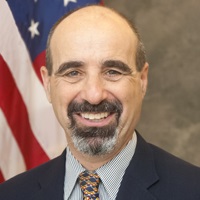 By Andy Bindman, M.D., Director of AHRQ
By Andy Bindman, M.D., Director of AHRQ
Twitter: @AHRQNews
If you’re ill, you want—and need—an accurate diagnosis. It’s the first step for you and your doctor to chart a course toward healing. But what if the diagnosis is wrong?
Recently, we hosted the Research Summit on Improving Diagnosis in Health Care—our first major summit on this topic and the first major research conference we have hosted in the new space we moved into about a year ago. It was great to open up the Agency’s home to the research community and to provide a venue for large numbers of our staff to interact with so many distinguished guests from academia, health systems, payers, patient advocacy groups, and government partners. And, if forced to pick one word to sum it up, I think I’d go with “wow.”
The agenda was packed and ambitious. The speakers were jazzed about participating in a national priority-setting conference on such an essential topic. And participants, whether attending onsite or virtually, were highly engaged.
We heard personal tales of diagnostic errors and near misses—sometimes with tragic results. (Check out the slide presentations.) We concluded with clear direction for AHRQ to pursue in-depth research in this area. I ended the day feeling energized by the proceedings and eager to move forward. And I know I wasn’t alone.
I believe that improving the diagnostic process—including reducing diagnostic error—is the next great frontier in patient safety. It is estimated that every American will at some point encounter a diagnostic error—a diagnosis that is delayed, missed, or wrong. How many will die as a result? Estimates diverge widely, but our best guess says many tens of thousands each year.
But what exactly do we mean by the term “diagnostic safety?” Why do errors happen? And how can we keep them from happening? These are the questions that we are just beginning to answer, but we began to explore them in several lively, interactive breakout sessions at our conference.
AHRQ has some history with this issue. The Agency provided initial funding to support creation of the Society to Improve Diagnosis in Medicine (SIDM). We’re also a government partner in the Coalition to Improve Diagnosis. To spur a call for action, we co-sponsored a report published last year by the National Academy of Medicine (NAM) on improving diagnosis. I like to think our commitment is one reason why AHRQ’s diagnostic safety summit drew national leaders in the field, including NAM President Victor Dzau, M.D., SIDM President Mark L. Graber, M.D., and Gordon D. Schiff, M.D., of the Brigham and Women’s Center for Patient Safety Research and Practice, one of the Nation’s leading researchers on diagnostic safety, as well as many other top experts in the field.
As the summit unfolded, one particular theme emerged that deserves emphasis: to significantly improve diagnosis within the context of a learning health care system, we need to support our capacity to generate, adopt, and apply knowledge.
The good news is that we already have many of the pieces in place to make strides quickly. These include—
- Foundational research from the DEER taxonomy, a highly regarded diagnostic error classification system that Dr. Schiff and his colleagues developed.
- Tools, such as TeamSTEPPS® and others developed by AHRQ that can be applied specifically to improving diagnosis.
- Institutional support, with the leadership of Dr. Dzau and NAM.
- Energy to change the culture broadly within health care with respect to diagnosis, as evidenced by the important work that Dr. Graber is doing with SIDM and that Paul Epner is doing with the Coalition to Improve Diagnosis.
That energy is palpable, and we at AHRQ are eager to harness it. Given our history as the leader in improving patient safety, we are naturally drawn and committed to the priority of improving diagnosis. We want to fund research as well as to create, disseminate, and implement tools that work. We hope the research findings that result from two current funding opportunity announcements (here and here) will add momentum to those goals. I look forward to keeping you posted on our progress on this critical issue facing our Nation’s health care system.
This article was originally published on AHRQ Views Blog and is republished here with permission.
